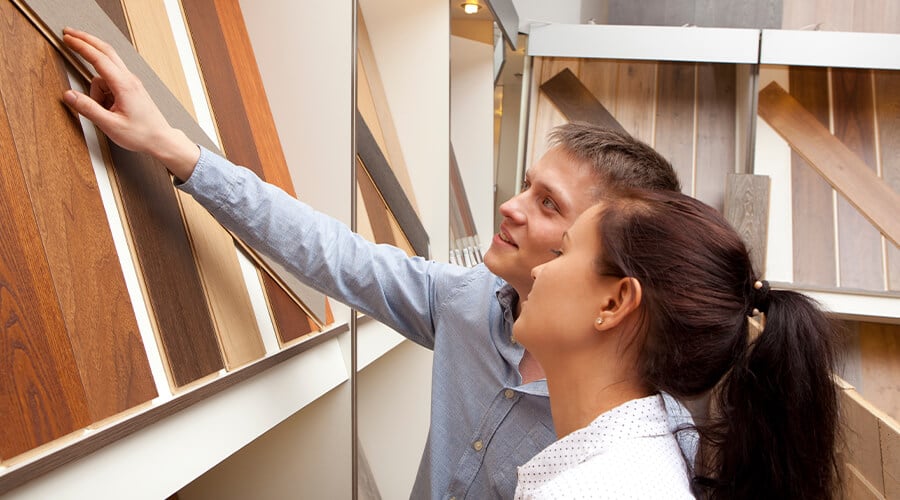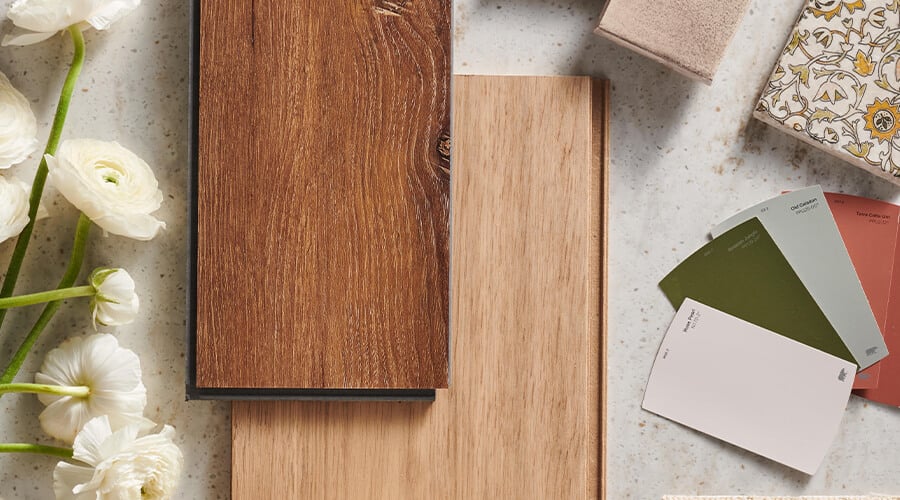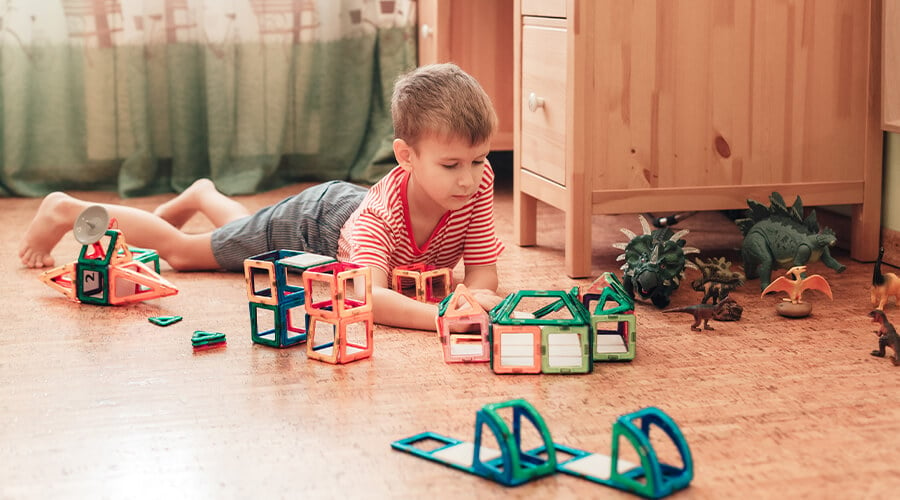While vinyl records have gone the way of disco and VCRs, vinyl flooring is in. Experiencing record highs in sales, vinyl flooring is growing increasingly popular with homeowners. This is likely due to the unique benefits that vinyl flooring provides. It’s easy to install and maintain, long-lasting, and provides a comfortable surface to walk on.
But, is vinyl flooring right for you? Before choosing vinyl, there are some important things you need to consider. Check out our list of 12 things you need to know before buying vinyl flooring below.
What is Vinyl Flooring?
Types of Vinyl Flooring
Vinyl flooring comes in 2 types—sheet flooring and tile flooring. Sheet flooring—which is laid down in sheets that are 6 or 12 feet wide—is water resistant and easy to install. Vinyl tile flooring comes in tile sizes of 9 or 12 square inches; it replicates the look of ceramic tile but is more economical. Luxury Vinyl Tile—which simulates stone or wood—comes in plank shapes, often 7" wide by 48" long.
Vinyl Finishes
There are 3 types of finishes for vinyl flooring, all of which provide a beautiful end result.
- Vinyl no-wax finish: This is the lightest type and is great for areas with light foot traffic and minimal exposure to dirt and moisture
- Urethane finish: More durable, this finish is heavier and can stand up to moderate foot traffic and is also resistant to scuffing and easy to clean
Cost
Per square foot, vinyl flooring is one of the most economic options of flooring that you can choose. On average, you can expect to spend $2-$12 per square foot to have it installed. Luxury Vinyl Tile—or LVT to those of us in the biz—is similarly inexpensive, costing on average, $3-$14 per square foot for installation. When you compare the cost to wood, stone, or ceramic flooring, vinyl offers a significant cost savings. And if you’re handy, you can cut costs even further by installing vinyl flooring yourself. Depending on the complexity of the project, you can expect to spend $1-$2 less per square foot if you perform the installation, but of course we are always happy to install your new flooring.
Ease of Installation
Installation of vinyl flooring is typically easier than installation of other flooring materials. A floating vinyl sheet, for example, doesn’t require glue or staples. Instead, peel and stick vinyl can simply be adhered to a prepared subfloor. Vinyl flooring can also be installed over concrete, hardwood, or plywood. It can even be installed over existing vinyl; however, it isn’t recommended if you have 2 or more preexisting layers.
Durability
Vinyl flooring is highly durable. If installed and maintained correctly, it can last upwards of 10-20 years. That said, vinyl is a great choice for the rooms in your house that get the most foot traffic. Additionally, most vinyl flooring has a wear layer on its surface that resists scratches and stains. Some vinyl products even offer warranties of up to 15 years on the wear layer. As with any flooring, the quality of the material that you purchase will affect how long it lasts.
Stain Resistance
As mentioned previously, some vinyl tiling has a wear layer that resists stains and spills—you can expect this protection with printed vinyl tiles and sheets. On the other hand, solid and composite vinyl tiles do not have this surface protection. As such, they’re more susceptible to stains and require occasional stripping and polishing to keep them looking like new.
Thickness
Vinyl is generally soft beneath your feet. Some vinyl sheets and tiles even have a padded layer, making walking on vinyl more comfortable. Also, vinyl floors are often referred to as "resilient" floors. This means that the floors have a certain degree of elasticity when you walk across them. Luxury Vinyl Tile is also quieter, as it has sound-absorbing properties.
Recommended Usage
Because of its durability, vinyl tiling makes a great choice for:
- Kitchens
- Bathrooms
- Basements
- Family Rooms
- Laundry Rooms
Maintenance
This is one area where vinyl tiling really shines. Maintenance tends to be a breeze. After sweeping your vinyl floor to remove dirt and grit, simply run a damp mop over it (using an approved vinyl floor cleaner) to keep your flooring looking its best. Most vinyl flooring has a "no wax" finish and will look just as shiny after mopping as the day that you bought it.
Design
Some might say that the design options of vinyl flooring are its greatest feature; vinyl’s versatility makes it a homeowner’s favorite. With so many different colors and patterns of vinyl flooring, your options are nearly endless. For instance, you can combine solid and composite vinyl to create unique, random patterns. Or consider printed vinyl. With it, you can create the look of stone or hardwood without the expense of using those natural materials.
Vinyl Repairs
High-quality vinyl flooring is very durable. However, low-quality vinyl can be susceptible to rips and tears, and refinishing it can be a challenge. In particular, this is especially true if you are using sheet vinyl. Because vinyl flooring cannot be refinished, once damaged, it needs to be removed and replaced.
Sunlight
Unfortunately, most types of flooring are susceptible to damage from the sun. Over time, vinyl flooring can fade in direct sunlight. It’s recommended that you draw the curtains shut to protect your flooring during times of heavy sunlight.
As you can see, vinyl flooring makes a great choice for the heavily trafficked rooms in your home. With its durability, economical pricing, and simple maintenance, it’s a very popular choice for people who wish to improve the look of their home. And with the multitude of design options available, vinyl provides a number of attractive looks and finishes. For more help with selecting your flooring, contact America’s Floor Source to make an appointment. We’ll be happy to walk you through your vinyl flooring options.





